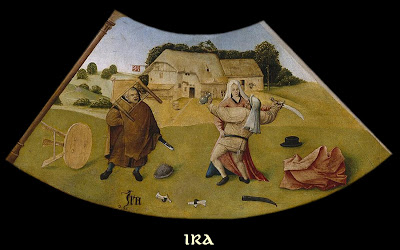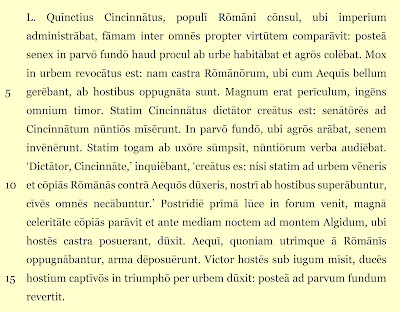Hyacinthus, rēgis Lacedaemoniī fīlius, nōtus inter omnēs propter pulchritūdinem erat; praecipuē ā deō Apolline amābātur. Ōlim cum deō discīs lūdēbat; tum Zephyrus propter invidiam, quod puer Apollinem amābat, Zephyrum autem nōn amābat, ventum ācrem ēmīsit et ingentem Apollinis discum in caput Hyacinthī immīsit. Statim mortuus humī cecidit. Posteā, ē terrā, ubi puerī īnfēlīcis sanguine cruentābātur, flōs pulcher surgēbat: flōris frondēs prīma littera nōminis notātae sunt. Itaque flōs ab omnibus hyacinthus vocābātur.
Narcissus
quoque propter pulchritūdinem magnam fāmam habēbat. Propter superbiam īram
omnium et invidiam movēbat. Itaque deī puerum īnfēlīcem pūnīvērunt. Ōlim ōris
imāginem in fluviō spectābat: statim pulchritūdinis amōre superātus est: diū
frūstrā imāginem captābat, tandem propter dolōrem vītā excessit. Ē locō, ubi
cecīderat, flōs pulcher surgēbat: flōs hodiē narcissus vocātur.
[A]
Paragraph #1
[1]
Who was Hyacinthus and why was he well-known? (2)
[2]
What did Apollo think of him? (1)
[3]
Lines 2 – 5 (Ōlim … cecidit) Which six of the following statements are true?
(6)
- A huge discus hit Apollo on the head.
- Hyacinthus and Apollo were playing with discuses.
- Hyacinthus was hit on the head by a huge discus.
- Apollo was killed.
- Hyacinthus didn’t love Zephyrus.
- Hyacinthus later died.
- Hyacinthus loved Zephyrus.
- Hyacinthus was immediately killed.
- Two gods were playing with discuses.
- Zephyrus loved Apollo.
- Zephyrus sent a wind.
- Zephyrus was jealous.
[4]
Lines 5 – 7 (Posteā … vocābātur.)
Explain
how the flower was given the name hyacinth.
- Where did the flower grow from? (3)
- What was on its leaves? (2)
[B]
Paragraph #2: complete the translation with the words listed below
Narcissus
on account of his __________ also had great __________. Because of (his)
__________ he stirred the __________ and __________ of __________. Therefore,
the gods __________ the __________ boy. He once __________ an image of his
__________ in a __________. He immediately __________ by __________ of (his)
beauty; for a long time he __________ the image __________; finally on account
of __________ he __________. From the __________ where he __________ a
beautiful flower __________; the flower today __________ the narcissus.
anger;
arrogance; beauty; began to arise; died; envy; everybody; face; grief; had
fallen; in vain; is called; love; place; punished; renown; river; tried to
capture; unfortunate; was looking at; was overcome
[C] Paragraphs #1 and #2: Find the Latin for the passive verbs and build the sentences some of which show the use of the ablative case to refer to [i] by whom an action was done and [ii] by what (with what) an action was done
[i]
(he) was / used to be loved
- (he) was loved ¦ by the god
[ii]
(the earth) was stained
- (the earth) was stained ¦ with the blood
- (the earth) was stained ¦ with the blood ¦ of the unfortunate boy
[iii]
(he) was overcome
- (he) was overcome ¦ by the love
- (he) was overcome ¦ by the love ¦ of beauty
[iv]
(the flower) is called
- (the flower) was called
[vi]
(the letters) were written (marked; noted)
- (the letters) ¦ of (his) name ¦ were written
[D]
Explain in your own words the meaning and, using the text, the origin of the
word narcissist.
https://en.wikipedia.org/wiki/Narcissus_(mythology)
























_text.jpg)










_text.jpg)
